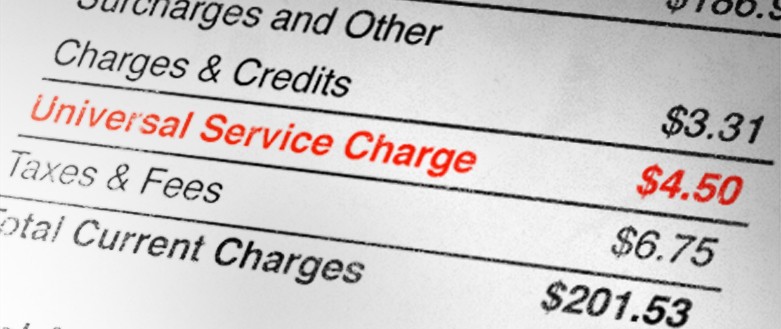
Rip-Off or Reform?

Consumers could see their fees jump if the FCC's plan goes through.
UPDATED 10/27/11: Today the FCC announced its plan for revamping the Universal Service Fund. While the agency didn't rubber-stamp the plan written by AT&T and Verizon, it missed a chance to bring real pro-consumer reform to a wasteful system.
In our statement, Free Press Political Adviser Joel Kelsey said that the rules would still allow carriers to impose new charges on local subscribers:
"The Commission did take steps to narrow the scope of these rate increases, but asking consumers to pay more into a broken system and letting the industry divvy up the pot will not increase broadband adoption. If the goal is to increase broadband adoption, prices should be going down, not up.”
--
Do you want to hand over even more of your hard-earned money to your phone company?
If you do, you’re in luck: The FCC has a plan for that. This week the agency is weighing a new rule that would give phone companies yet another way to reach into your pocket to pad their profits.
Here’s the deal: The FCC has proposed a so-called “reform” of the Universal Service Fund (USF), a program that has helped secure telephone access for millions of Americans, and which is funded via a small fee in our monthly phone bills. (Look for a line item labeled something like “universal service charge” or “federal government surcharge” and you’ll find the fee.)
The program’s goals are noble but outdated. So the FCC is looking to funnel these funds toward broadband infrastructure rather than phone lines. There’s just one problem. The FCC has proposed rules that could allow phone companies like AT&T and Verizon to extract billions more from consumers with no accountability.
If we don’t get the FCC to change its plan, carriers would have free rein to add up to $4.50 more to your monthly bill. In an era of $100 “triple-pay” packages, do AT&T and Verizon need more of our money?
Meanwhile, those Americans who can least afford higher bills and who are less likely to have broadband — the poor and the elderly — are the ones who would bear the greatest burden of this rate increase.
A few lawmakers have caught wind of this problematic plan. Reps. Mike Doyle (D-Pa.), Anna Eshoo (D-Calif.) and Jay Inslee (D-Wash.) all sent letters to FCC Chairman Julius Genachowski that voice their concerns about the impact the proposed plan would have on consumers’ pocketbooks. But we need more. We urge other lawmakers to follow these members’ lead and oppose allowing phone companies to raise our rates more in this difficult economic climate. These rules must benefit the public, not big telecoms.
Right now, people around the country are rising up against corporate wrongdoing. This is no time to allow another transfer of our cash to the wealthiest corporations. Click here to tell the FCC to stop its plan to rip off the American people.